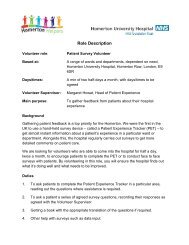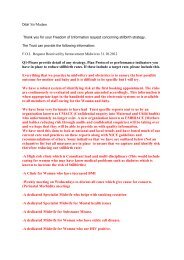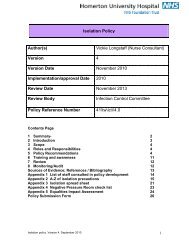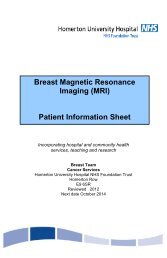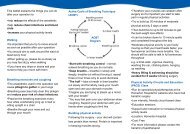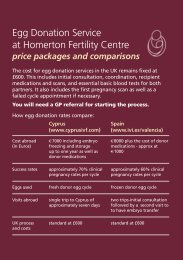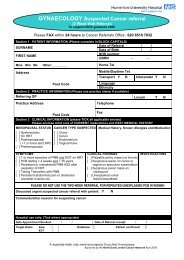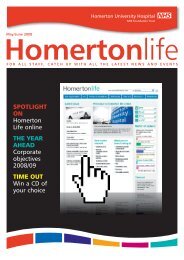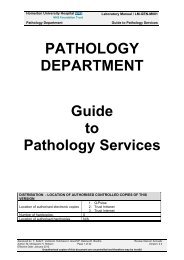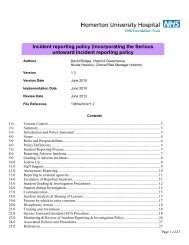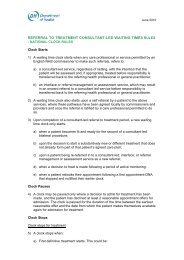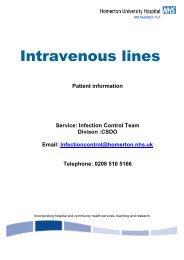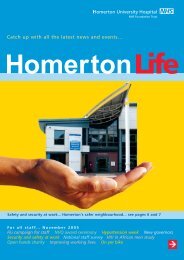Going home with a catheter patient information leaflet - Homerton ...
Going home with a catheter patient information leaflet - Homerton ...
Going home with a catheter patient information leaflet - Homerton ...
You also want an ePaper? Increase the reach of your titles
YUMPU automatically turns print PDFs into web optimized ePapers that Google loves.
<strong>Going</strong> Home <strong>with</strong> a Urinary<br />
Catheter and Follow up Care<br />
Patient Information Sheet<br />
Department of Urology<br />
<strong>Homerton</strong> University Hospital NHS Foundation Trust<br />
<strong>Homerton</strong> Row, London, E9 6SR<br />
Reviewed: June 2012<br />
Next date: June 2014<br />
Incorporating hospital and community health<br />
services, teaching and research
This <strong>leaflet</strong> explains how follow up care for your <strong>catheter</strong><br />
works after you have been discharged <strong>home</strong> from<br />
hospital.<br />
Before you leave the hospital, your nurse will explain<br />
why you have a urinary <strong>catheter</strong> and how to care for it. If<br />
you follow the instructions, it will help avoid problems<br />
such as infections or blockage.<br />
What is a urinary <strong>catheter</strong><br />
A <strong>catheter</strong> is a flexible tube which drains urine from your<br />
bladder. The <strong>catheter</strong> is inserted through the urethra<br />
(water pipe) into the bladder. Once the <strong>catheter</strong> is in<br />
place a small balloon at the <strong>catheter</strong> tip (inside the<br />
bladder) is inflated to prevent the <strong>catheter</strong> from falling<br />
out. Urine drains from your bladder into the <strong>catheter</strong> bag.<br />
Diagram of a <strong>catheter</strong><br />
The department or ward will make a referral to your<br />
district nurses when you leave hospital and they will<br />
carry out ongoing care for your <strong>catheter</strong>. However, it<br />
would be advisable for you to contact your GP the day<br />
you get <strong>home</strong> to ensure the district nurses know you<br />
have a <strong>catheter</strong>.<br />
You can also contact the Urology Nurse Specialist on<br />
020 8510 7862 during normal working hours if you need<br />
further advice on caring for your <strong>catheter</strong> and any follow<br />
up arrangements <strong>with</strong> the Urology department.<br />
Things you need to know while at <strong>home</strong>:
1. Personal hygiene<br />
Always wash your hands before and after draining or<br />
changing a bag.<br />
2. Drainage bags<br />
You need two types of drainage bags:<br />
normal clothing during the day.<br />
A night bag which is larger and connects<br />
to the bottom of the leg bag to collect the<br />
urine which drains from your bladder<br />
overnight.<br />
If you need supplies of leg bags and night bags you will<br />
need to contact your district nurse or GP. Alternatively,<br />
you can obtain advice and supplies through the <strong>home</strong><br />
delivery service, Charter Healthcare on 0800 374654.<br />
Please contact your GP or your district nurse if you<br />
have the following:<br />
Catheter falls out<br />
Pain not relieved by simple pain killers e.g.<br />
Paracetamol<br />
Catheter is not draining urine<br />
Blood in your urine that does not clear after<br />
drinking fluids<br />
Your urine is cloudy, discoloured or smelling<br />
Burning sensation when passing urine and does<br />
not improve after drinking fluids<br />
You feel feverish and unwell<br />
Urine keeps leaking around the <strong>catheter</strong><br />
If urine is not draining, here are a few things you can try<br />
before you attend the Accident and Emergency<br />
department:<br />
Ensure there are no kinks in the <strong>catheter</strong> or<br />
drainage tubes. Keep the drainage tubes straight
Check the drainage bag is situated below the<br />
bladder at all times<br />
Make sure you are drinking at least 8 glasses of<br />
water or fluid a day<br />
If you are constipated increase the intake of high<br />
fibre food d. Inform your GP. You may need<br />
some medicine to stimulate your bowels<br />
Other formats<br />
If you require this <strong>leaflet</strong> in any other format such as<br />
larger print, audio tape, Braille or another language<br />
please speak to your urology nurse specialist.<br />
Health and Cancer Information Centre is based at the<br />
main entrance of the <strong>Homerton</strong> Hospital. It provides<br />
<strong>information</strong>, support and advice to all <strong>patient</strong>s, family<br />
members and carers.<br />
Email: healthshop@<strong>home</strong>rton.nhs.uk<br />
<strong>Homerton</strong> Hospital PALS (Patients Advice & Liaison<br />
Service)<br />
PALS is based in the main reception of the hospital.<br />
Email: pals@<strong>home</strong>rton.nhs.uk<br />
Tel: 020 8510 7315 (9am – 5pm)<br />
PALS provides confidential <strong>information</strong> and support,<br />
helping you to sort out any difficulties or concerns you<br />
have whilst in hospital, guiding you through the different<br />
services from the NHS.<br />
Related websites:<br />
http://www.nhs.uk/conditions/Urinary<strong>catheter</strong>ization/Pages/Introduction.aspx<br />
<strong>Homerton</strong><br />
<strong>Homerton</strong> University Hospital NHS Foundation Trust<br />
<strong>Homerton</strong> Row, London, E9 6SR<br />
T 020 8510 5555<br />
W www.<strong>home</strong>rton.nhs.uk<br />
E enquiries@<strong>home</strong>rton.nhs




